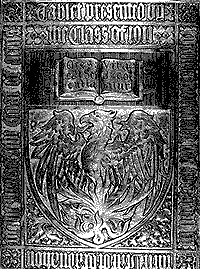From
our pages
 1910
1910
The April Magazine reported on "undergraduate agitation"
for a University seal. Sparked by editors at the Daily Maroon,
the Undergraduate Council decided, after numerous resolutions,
to write the officers of all U of C alumni clubs, asking for their
help in creating both a motto for the University and ideas for
a seal. The Magazine declared, "The choice of a seal is
a movement in which all Chicago men and women--faculty, students,
and graduates--can unite with good grace. The Alumni Council will
assist every effort made by the students to have suitable designs
submitted."
 |
| University
Seal (see 1910) |
1950
Founded in 1943 to train businessmen in the "arts of communication,"
the Great Books program, led by Robert Maynard Hutchins and Mortimer
Adler, started as a group of 50 Chicago business leaders meeting
in the Loop at the University Club. Despite favorable reaction,
Hutchins and Adler did not think the program would flourish, according
to the April Magazine. They worried that the program's
interdisciplinary nature would scare people away. They were wrong.
Within three years, there were more Great Books groups in Chicago,
as well as in Indianapolis, Detroit, and Cleveland. By 1950, 50,000
participants in 400 locations were meeting to discuss classic
texts.
1975
The U of C Chess Team was "toppled from the supremacy it has held
for the past two years" at the 20th annual Pan-American Intercollegiate
Chess Team Championships held in Louisville, KY. But as the Spring
Magazine noted, the team was not "toppled very far." At
the end of the five-day tournament, Chicago tied with Harvard
for second place, surrendering first place to the University of
Toronto. Despite the defeat, Chicago's A team remained tied for
No. 1 among U.S. teams. "And Chicago, with five championships,
still reigns as the powerhouse of collegiate chess; Columbia,
the closest rival, has four," reported the Magazine.
1990
The Spring Magazine reported what could be taken as a sign
that the cold war was finally over: In its Spring issue, the editors
of the Bulletin of the Atomic Scientists announced that
they were resetting the Doomsday Clock from 11:54 a.m. to a full
ten minutes till midnight. The change--determined by the Bulletin's
board and its editor--reflected "revolutionary changes in
Eastern Europe that have brought an end to the cold war." Dennis
Flanagan, editor emeritus of the Scientific American, disagreed
with the decision, stating, "Events are so unstable and further
change is so likely that I thought we shouldn't change the clock
at all."--Q.J.



![]()
 1910
1910